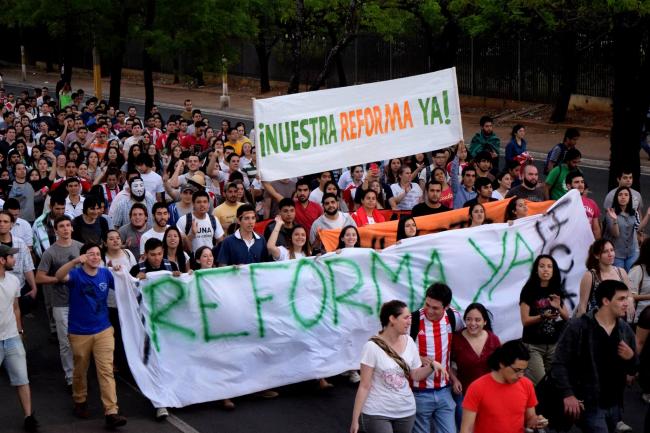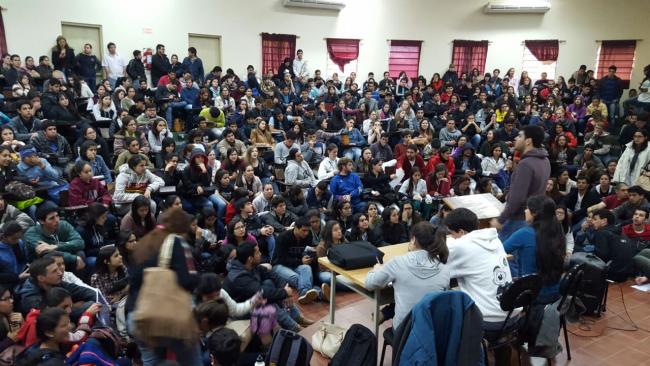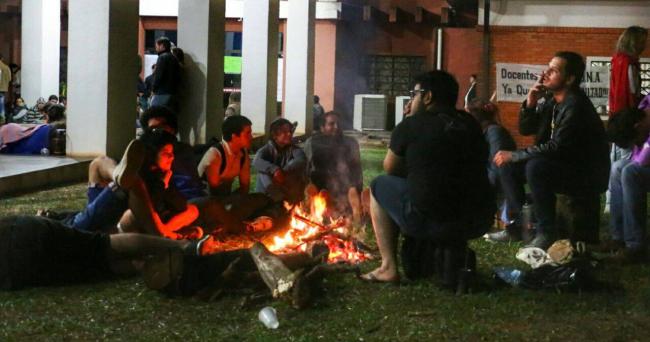
University students are making history in Paraguay in what is being dubbed La Primavera Estudiantil, or Student Spring. Over the last weeks, students and their allies mobilized one of the largest protest movements in the country’s history, demanding democratic reforms to the governance statutes of Paraguay’s largest public university, the National University of Asunción (UNA). Should they succeed, it would arguably mark the first time in the country’s modern history that major national reforms result from social movement pressure. Student protesters’ success in mobilizing mass support and sympathy both reveals important changes in Paraguayan politics and has potential to transform the country further still.
Beginning in late August, protests attracted thousands of students and unified the university’s 12 schools, or faculties, in a student strike and a sit-in that paralyzed the campus. Students pledged to lift the strikes only when university leaders accept four basic reforms to university governance: the elimination of the absolute majority currently held by professors in the university governing assembly, which is composed of elected representatives of the professors, students, and alumni from each school; term limits for elected university leadership positions; a ban on the “personal appointees” (“cargos de confianza”) of university leaders running for and occupying elected office in university governing bodies; and the creation of an independent electoral commission to regulate university elections.
In response to student mobilizations, the university assembly met on September 29 to debate and vote on the proposed changes to the university statutes. As occurred on two earlier occasions over the last two months, the assembly failed to approve the reforms demanded by the students, provoking further mobilization. In early October, the conflict has reached a new pitch as university administrators and a faction of allied student leaders push ahead with elections for the University Assembly. Student and faculty activists have boycotted these elections, regarding them as illegitimate and potentially illegal under the current circumstances. Anti-democratic practices—such as the failure to publicly announce the schedules and procedures for selecting and vetting candidates—have suppressed competition and permitted university leaders to handpick candidates. Students activists are demanding that the elections be postponed until the reforms are approved and have successfully halted elections in the Agronomy, Engineering, and Medical Schools after lodging legal complaints with the national electoral commission.
A Year of Conflict at the National University of Asunción
The current occupation and protests began on August 24 of this year, when the university assembly refused to vote on the statute reforms proposed after eight months of negotiations by a working group of student and faculty leaders. University leaders appointed the working group to draft new statutes in order to end a similar wave of protests that erupted one year ago when student activists exposed a massive corruption scandal among the university’s top leadership. At that time, students occupied university offices and recovered documentation showing that the university president, Froilán Peralta, had engaged in graft and nepotism, assigning multiple salaries to the family and friends of his former secretaries.
A series of bizarre scenes unfolded during the 2015 occupation. A hooded university administrator, attempted to enter university offices to steal documents; one secretary, who apprehended and detained by students in a car at the campus gates, began to eat the paper documents she had removed in order to eliminate their evidence. Public prosecutors delayed in investigating the scene to document the evidence of the raid, and eventually did so only under the scrutiny and pressure of student protestors. A crisis of leadership ensued after Peralta was arrested and 12 other university administrators were charged with corruption. Eventually, new university leaders were chosen and agreed to hold ongoing negotiations with student leaders. In all, the 2015 protests forced the resignation of 74 administrative employees and 232 professors, deans, and vice deans. A total of 42 university officials were also indicted.
Although provoked by outrage over corruption, the student protests have brought to light how the lack of accountability of university leaders and professors permits them to perpetrate broader political and personal abuses with impunity. Traditionally, university leaders have distributed lucrative salaries and positions among members of the country’s ruling Colorado Party, using the threat of dismissal and marginalization to quiet politically dissenting voices. According to Mauricio Portillo, a student representative in the veterinary school, faculty leaders recruit activists from among the students that are in danger of failing, offering to help them out with their grades if they become active in student government, support the official positions of the university faculty, and work to marginalize reformist and radical students.
Under these circumstances, politically privileged professors are also free to abuse their power in the classroom. In addition to stealing resources that are budgeted to expand and improve academic programs, university leaders hire and protect unqualified and unmotivated researchers and instructors—many of whom lack training and experience in their subject matters—produce low quality research, and often do not even show up for classes they are assigned to teach. Explicit gender bias and sexual harassment are widespread in the classroom. In June 2016, a medical school professor was indicted on charges of sexual harassment, and students at the UNA have since raised accusations that a group of male professors has systematically coerced sexual favors from their female students. Law school students have also reported that professors have called them on the day of final exams, demanding steep payments if students wish to receive a passing grade.
University leaders have responded to the growing student movement with intimidation and even threats of physical violence. During last years’ occupation, students discovered that administrators had been keeping dossiers on dissident student leaders and collecting information about their social media posts and activities—a practice all too reminiscent of the extensive domestic intelligence apparatus that was used to quash political opposition and dissent through targeted harassment, arrests, torture, and forced disappearance during the country’s 35-year dictatorship (1954-1989).
Examples of more explicit repression abound. Seventeen students from the National University of the East, in Ciudad del Este, are currently in criminal proceedings, after occupying university offices last year in order to protect evidence of corruption from university officials intent on destroying it. Two weeks ago, the public prosecutor offered arrest warrants for four student leaders, accusing them of “abducting” members of the University Governing Assembly, after student protesters had surrounded the building where university leadership was meeting to discuss reforms to the university governing statutes. The charges were dismissed, but the tactic is a common one utilized by the prosecutors to intimidate social movement leaders and demobilize their followers. Following the University Assembly last week, police detained and questioned four private security guards hired by the dean of the UNA Medical School after they physically assaulted two student activists using a metal chain. The School of Philosophy’s dean, Ricardo Pavetti, recently accused student leaders occupying the school of receiving support and “taking orders” from “foreigners,” stating, “it is legitimate to repel violence with violence.”
University leaders also exercise ideological censorship, particularly in the social science programs that are housed in the law school—an institution that is deeply tied to the authoritarian tradition of the Colorado Party. This is a direct legacy of the dictatorship of Alfredo Stroessner, which did not permit political science to be taught as a discipline in Paraguay in order to limit the introduction of critical, dissident political thought. The university has offered majors in political science and sociology only since 2003. The curriculum, faculty hiring decisions, and administration has remained subordinated to partisan and nepotistic law school administrators, who are unsympathetic to the development of critical social sciences. Students lifted their occupation of the Social Science School last year, only after forcing the resignation of the School’s director and securing a signed agreement from its interim director to work towards its formal independence from the Law School. But to date this agreement has gone unfulfilled by university officials.

Resurgent Authoritarianism in Paraguay
The resurgent partisan and authoritarian control of the university and the massive student resistance are emblematic of rising tensions in contemporary Paraguay. The student strike is only one of a broader set of conflicts that have emerged after a decade of convulsive political change. In 2008, 60 years of one-party rule ended when former bishop, Fernando Lugo, came to power with a coalition of convenience composed of the Liberal Party—a traditional opposition party dominated by landed and oligarchic interests—and a collection of left-wing movements and progressive parties advocating the expansion of social rights and land reform. During this brief democratic opening, former representatives of civil society came to hold important positions within the state and used that newfound power to push forward a series of reforms, including a major expansion of public health services, limited civil service reforms, and the renegotiation of payments Paraguay receives from the Brazilian government for electricity generated at the Itaipu Binational Dam.
These changes began to loosen the Colorado Party’s longstanding control over state resources. However, during this period of reform the Colorados and their oligarchic counterparts in the Liberal Party retained overwhelming control of the Paraguayan legislature, blocking avenues for legislative change. In 2012, just as the legislature became the target of Paraguay’s first broad-based urban social protest movements, Colorado and Liberal Party legislators took advantage of the fallout from a violent land conflict in the district of Curuguaty to impeach President Lugo in a two-day trial. Dubbed an ‘institutional coup’ by international observers, the overtly political motivations behind Lugo’s impeachment foreshadowed the recent ouster of President Dilma Rousseff in Brazil.
Lugo’s impeachment shattered the coalition that had brought Lugo to power, breaking the nascent protest movement into partisan factions, discrediting the Liberal Party after a few brief months of usurping executive office, and paving the way for the Colorado Party to regain the control of the presidency in elections held in 2013. Since then, the direction of Paraguayan society and the character of the state has been in dispute. The Colorado Party is split between a traditional authoritarian faction that has remained strong in the legislature and a new, neoliberal, crony-capitalist faction led by President Horacio Cartes, which has provided the Party with the financial resources necessary to regain power. Meanwhile, the opposition has remained divided between an electorally weak left and the ideologically conservative Liberal Party.
In this context, Paraguay has experienced the delayed arrival of the kinds of neoliberal policy proposals that other Latin American countries experimented with in the 1990s, such as public-private partnerships, privatization, and international financial liberalization. While economic growth has been among the most resilient in Latin America, it has done little to address deeply entrenched rural inequality or to stem the growth of new urban poverty and inequality. The political and economic dislocations of recent years have left Paraguayans materially insecure, acutely distrustful and resentful of the political establishment, and in search of an outlet for their political discontent. As evidence of this discontent, organized labor recently carried out two general strikes—the first in over fifteen years—in opposition to a new law on public-private partnerships, and mobilizations in the countryside continue to resist the dispossession of campesino communities by agribusiness. In recent weeks, ordinary citizens also filled the Asunción’s central plaza to protest a law that would have tripled the bonuses paid to Senate staffers, even as the country’s urgent medical and educational needs go unmet.
At the same time, Paraguay has witnessed a resurgence of the authoritarian practices by which the Colorado Party controlled civil society during the dictatorship. The criminalization of social protest, specifically the conviction, arrest, and imprisonment of peasant leaders figures prominently among these practices. The most explicit such example was the recent conviction of 11 campesinos for crimes of homicide, criminal conspiracy, and trespassing in connection to the death of nine policemen at Curuguaty. During the year-long trial, prosecutors provided no direct evidence to convict the accused campesinos of murder, but relied instead on rhetoric that equates peasant organizations with political subversion and terrorism. Furthermore, no investigation was ever carried out and no charges have been brought in connection with the shooting of 11 campesinos that also occurred when a heavily armed contingent of 300 policemen evicted 60 men, women, and children from land they were living on. Human rights and peasant organizations currently maintain a permanent vigil outside the Paraguayan Supreme Court calling for the annulment of the trial.
The Promise of the Student Movement
The struggle to democratize the UNA has been waged by successive generations of students. Taking up this legacy, the current student protests have already achieved historic victories—a clear signal of generational changes and the potential for the renewal of political and social movement leadership. The current generation of university students is the first to be born after the end of the dictatorship in 1989 and the country’s adoption of a democratic constitution in 1991. Today’s university students have grown up enjoying greater civil and political freedoms and greater access to information about the outside world than earlier generations. And student leaders have also come of political age at a time when, in contrast to Paraguay’s democratic regression, most of Latin America witnessed a political turn to the left, a resurgence of social movement activism, and the expansion of social rights. As their heightened expectations collide with persistent authoritarianism in the institutions that shape their lives, they have been more willing than any earlier generation to mount massive and sustained resistance.
Paraguayan high school students have been the leading edge of this resistance. After the collapse of a public school building in May 2016, students occupied a high school in the capital, demanding that the minister of education resign to take responsibility for the disastrous state of public school infrastructure and inadequate levels of investment. The students were joined by others from across the entire country, who occupied a total of 130 high schools for more than two weeks, and eventually forced the minister to resign. These students have gained an understanding early in their lives of their exclusion from the privileges enjoyed by the country’s political elite, along with a sense of collective agency in demanding their rights to public goods from the state.

Currently, students are tied together by their common frustrations with a mediocre university led by an entrenched and self-interested elite. Beyond that, however, students entered this movement with vastly different aspirations for themselves, disparate visions of the kind of university and society they’d like to see, and conflicting views of the political controversies roiling the country. But the scenes from the current mobilizations offer hope that it will serve as a formative experience for this generation and give rise to collective identities rooted in a new democratic ethos. In each faculty, students reached decisions about joining the strike and adopting negotiating positions at general assemblies, through open debate and direct voting, thus permitting the mass of students to hold their own leaders accountable. In Paraguay, where authoritarian leadership is common even in progressive social movements, this experience offers students profound lessons about the efficacy and legitimacy of democratic organizing.
In recent weeks, the university campus has also served as a laboratory for creative expression, organizing, communication, and the crafting of new public narratives. While formal classes were suspended, students organized workshops on research methodology, lectures on the history of the student movement, art installations, poetry readings, sporting events, bon fires, and music concerts—all in the name of reform. Student marches have brought thousands to the streets and roused the support of sympathetic professors, parents, public media figures, and even some private companies.
Presently, students are regrouping following the university’s third refusal to consider their reforms, discussing and debating amongst themselves how to maintain action in the absence of institutionalized organizations that would permit them to craft longer term strategies toward reform. Whether or not the students succeed in achieving their desired objectives at this juncture, they have already begun to craft a new, more hopeful public narrative about the possibilities for change in Paraguay, the urgent need for democracy, and the imperative for collective social action. Indeed, the real promise of the Paraguayan “Student Spring” lies in the lasting ties of solidarity, the sense of collective political agency, and the practical experience with democratic mass movement organizing that it has generated. These are crucial accomplishments for the future of social movement politics in Paraguay.
An earlier version of this piece appeared at NYU CLACS.
Gustavo Setrini is a Paraguayan political scientist and assistant professor of Food Studies at NYU’s Steinhardt School of Education, Culture, and Human Development. He is also a faculty affiliate of the NYU Center for Latin American and Caribbean Studies.

